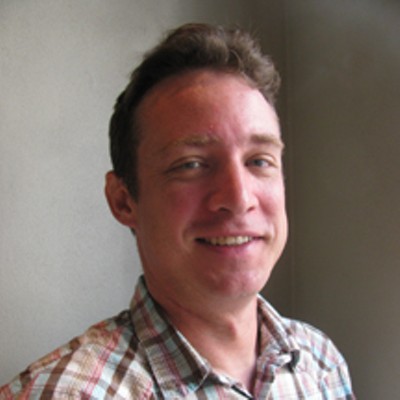After listening to his debut, Exotic Demonic Blues, you half expect to hear the screams of torture victims, the whipcracks of a cat-o'-nine-tails and zombies mumbling about finding "more brains" when you talk to him on the phone. But no, in reality you just get a levelheaded guy with an easy laugh talking about Hawkins ("He's like my god," Wexton says of the late morbid, theatrical blues shouter) and his other influences (people like Waits, Nick Cave and Jim "Foetus" Thirlwell and styles like roller-rink music and '50s Italian horror soundtracks).
Evidently, a lot of folks are surprised to find that he is quite sane. "Everyone says that," Wexton laughs. "The Voodoo Organist is the other side of me." (Of course, he can't always get that other side to stay in the shadows; at one point in the interview, Wexton offhandedly expresses interest in visiting Houston's National Museum of Funeral History.)
The Waits and Hawkins influences are obvious. From the first, Wexton frequently borrows the overwrought, growling, post-Swordfishtrombones style of singing. (When he doesn't sound like Waits, he alternately sounds like locals Allen Hill and Mike Barfield.) From the second comes the fascination with the undead and the ghoulish. Equally important, though, and seldom commented upon, is the guiding hand of Perrey, the space-age pop Frenchman who pioneered the use of Moog synthesizers in the early 1960s and is credited by some sources as an inventor of electronica.
Last year, Perrey's solo work and his collaborations with Gershon Kingsley were rereleased, complete with two Fatboy Slim remixes to entice the kiddies, on the double CD The Out Sound from Way In: The Complete Vanguard Recordings. Of course, Wexton didn't need Fatboy's stamp of approval; he's been a fan forever. "I've actually got an original vinyl copy of that album," he says. "His stuff's amazing -- all those loops. He used to splice tape with that, like 20, 30 years before samplers and all that. The loops that he comes up with are just amazing."
Perrey's style is most evident on "Voodoo Blues," one of Exotic Demonic's best cuts. Over a stuttering, shuffling beat, a pulsating organ and a skronky loop, Wexton howls about how the devil lied to him down at the crossroads. "That's a sampled beat," he says. "Sometimes I play 'em on my keyboard, sometimes I use reverb. I get my beats a number of different ways."
In contrast to the bone-chilling sounds of performers like Waits, Hawkins and Cave, Perrey's music is chirpy and quirky, and so are its echoes in the music of the Voodoo Organist. It's one of at least two paradoxes that make him interesting: One, the blues/gospel/country and other roots music influences nicely collide with something a wee bit avant-garde. Two, his music is scary and funny at the same time; he doesn't take himself or his shtick the least bit seriously.
Wexton's invention of the Voodoo Organist came slowly. In 1994, he left his native Detroit ("I'm from the city of murder / and I'm gonna take my life further," he sings on "Kabam!" sounding a little like Eminem) to join his friend Steve Austin's eclectic indie/noise rock/metal band Today Is the Day, which was then based in Nashville. After a couple of years, Wexton left the band and moved first to San Francisco and then Los Angeles, where he lives today. He briefly considered a move to what would seem to be his true spiritual home -- New Orleans -- but admits that he couldn't handle the humidity.
During this time of flux, Wexton moved away from his concentration on organ and was selling himself as more of a keyboard jack-of-all-trades. But in L.A., he reconnected with his original instrument. "I had a band in Los Angeles, and at that time I was moving back toward the organ again," he says. Slowly, by attrition really, the Voodoo Organist came to life. "The band I was in was a four-piece, and we kicked one of the guys out, one of the guys joined the army, and at that point it was just me and the drummer, so I just figured I would just go solo."
A likely story. Wexton probably turned them all into zombies.




